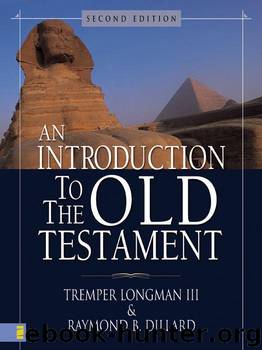An Introduction to the Old Testament by Tremper Longman Iii & Raymond B. Dillard

Author:Tremper Longman Iii & Raymond B. Dillard
Language: eng
Format: mobi
Tags: Non-Fiction, Reference
ISBN: 9780310263418
Publisher: Zondervan
Published: 1994-12-22T00:00:00+00:00
Introduction
A discussion of the theological message of the Psalter is difficult for two reasons. First, the book is composed of 150 individual compositions and, accordingly, does not present a systematically developed argument. Second, as will be more fully explored below, the psalms are prayers sung to God; thus, they present us with the words of the congregation addressed to God, rather than the word of God addressed to the people of Israel. How, then, is it possible to speak of the theological concerns of the Psalter?
Reading through the book of Psalms, one comes away with the impression that joy is the predominant mood.
It is true that the Psalter does not present us with a neatly developed systematic theology. The psalms do not progressively unfold the character of God or the nature of his relationship with human beings from its beginning to its end. However, the psalms are a rich source for theological teaching and reflection. While it is correct to say that the Psalter’s theology is not systematic, we must be quick, on the other side, to affirm that it is extensive— so extensive, in fact, that the Psalter is a “microcosm” of the teaching of the whole Old Testament. In the well-known words of Martin Luther, the book of Psalms is “ a little Bible, and the summary of the Old Testament.” Therefore, the real difficulty in a discussion of the theology of the Psalter is not lack of subject matter, but the realization that the theology of the Psalter is coextensive with the theology of the Old Testament.
The other potential stumbling block to a theology of the Psalter is that it is a book composed primarily of prayers. Men and women cry out to God. In this regard, the Psalms may be contrasted with the bulk of the Old Testament. In the prophets, for instance, we clearly hear the voice of God as he addressed the community through his chosen mediator (cf. the familiar phrase “ thus says the Lord”). Many conclude from this contrast that the book of Psalms presents us with the human response to the divine encounter. Thus, while instructive, the teaching is not normative theology. Many people support such a view of the Psalter with an appeal to the curses of the psalms (Pss. 69: 22– 29; 109: 6– 21). God is not teaching his people to hate his enemies, is he? After all, elsewhere God teaches that his people should love their enemies.
It is incontestably true that the psalms are prayers, not oracles. However, their inclusion in the canon attests to their nature as the word of God. After all, though the divine presence is much clearer in the prophets and even the historical books, these words also were delivered through the mediation of human beings. Furthermore, not every prayer of Israel is found in the Psalter. The prayers of the Psalter are the prayers accepted by the priests into the formal worship of Israel (1 Chron. 16: 4– 38).
Thus, it is meaningful to discuss the theology of the Psalter.
Download
This site does not store any files on its server. We only index and link to content provided by other sites. Please contact the content providers to delete copyright contents if any and email us, we'll remove relevant links or contents immediately.
| Guides | New Testament |
| Old Testament |
The Five People You Meet in Heaven by Mitch Albom(2861)
Name Book, The: Over 10,000 Names--Their Meanings, Origins, and Spiritual Significance by Astoria Dorothy(2506)
Real Sex by Lauren F. Winner(2498)
The Holy Spirit by Billy Graham(2445)
The Secret Power of Speaking God's Word by Joyce Meyer(2268)
How The Mind Works by Steven Pinker(2243)
0041152001443424520 .pdf by Unknown(2241)
ESV Study Bible by Crossway(2195)
Ancient Worlds by Michael Scott(2122)
The Meaning of the Library by unknow(2083)
The Gnostic Gospels by Pagels Elaine(2048)
Churchill by Paul Johnson(2025)
The ESV Study Bible by Crossway Bibles(2009)
MOSES THE EGYPTIAN by Jan Assmann(1985)
Jesus by Paul Johnson(1902)
Ancient Near Eastern Thought and the Old Testament by John H. Walton(1862)
The Nativity by Geza Vermes(1859)
The Complete Dead Sea Scrolls in English (7th Edition) (Penguin Classics) by Geza Vermes(1857)
City of Stairs by Robert Jackson Bennett(1853)
